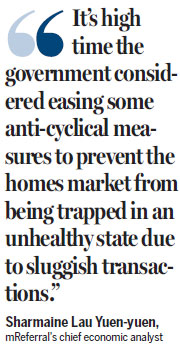Calls grow for easing of housing curbs
Updated: 2016-04-27 07:17
By Oswald Chan in Hong Kong(HK Edition)
|
|||||||||
With Hong Kong's property sector tipped to continue its downward slide in the next 12 months after feverish hikes in homes prices over the past few years, calls have mounted for the government to relax some of the tough measures introduced in 2010 to halt rampant speculation in an overheated market.
mReferral Mortgage Brokerage Services - the city's mortgage loan service provider - has joined the chorus for at least two of the curbs to be eased - the Double Stamp Duty (DSD) system, as well as the required stress test on mortgage loan borrowers' repayment ability.
Such a move, it says, would help boost dwindling homes transactions and maintain price stability in the local market.
"Although developers are offering more concessions to lure first-hand homes buyers, and secondary-homes owners are more willing to negotiate with potential purchasers, the existing anti-speculation measures will still deter buyers," warned Sharmaine Lau Yuen-yuen, mReferral's chief economic analyst.
"It's high time the government considered easing some anti-cyclical measures to prevent the homes market from being trapped in an unhealthy state due to sluggish transactions," she said.

A raft of anti-speculation measures has been in place since November 2010, aimed at driving out speculators from the market. They include the levying of various stamp duties and tightened down-payment ratios for mortgage loans.
mReferral suggests that the DSD levy system should first be relaxed. Currently, all local first-time homes buyers and those upgrading their flats have to pay a stamp duty of HK$100 ($12.9) if property considerations are below HK$2 million.
mReferral suggests if this practice can be extended to properties worth less than HK$5 million, it will save a lot of DSD payments and, probably, 60 percent of local homes buyers can benefit from it.
The local mortgage loan provider also recommends that the stress test on mortgage loan borrowers' repayment affordability be eased, with the assumed mortgage loan rate hike be set at 2 percent instead of 3 percent, saying such a move would allow more people to own homes.
Financial analysts have shown divergent views on the local property price trend.
"We reiterate our positive stance on Hong Kong's property segment because interest from the wealthy plays an important role in the city's residential property demand," said Jonas Kan Kwok-yu, head of Hong Kong/China property research at Daiwa Capital Markets.
"Some positive undercurrents seem to have emerged in the local residential market. The scope for positive surprises in the residential segment looks greater than before because the wealthy in Hong Kong have come out to look for quality units at reasonable prices," Kan added.
However, US-based real-estate services company Colliers International Group is less sanguine about the local property market.
"Given severely stretched affordability, slowed demand and increased homes supply, we expect prices to slide 10 percent in 2016, with luxury residential prices falling 15 percent," Colliers International said in its Hong Kong property research and forecast report for the first quarter of 2016.
"While we do not expect a sudden collapse, we think local homes prices could fall 30 percent or more over the next three years. The downward pattern in the homes market deepened in the first quarter this year amid growing economic worries," the report said.
The number of applications for mortgage loans in February dropped 24.4 percent month-on-month to 4,869 - the lowest since June 1998 - according to the Hong Kong Monetary Authority. Mortgage loans approved during the same period dived 18.1 percent, compared with January, to HK$12.8 billion, while mortgage loans drawn down in February slumped 16.2 percent on a monthly basis to HK$10.5 billion.
oswald@chinadailyhk.com
(HK Edition 04/27/2016 page9)